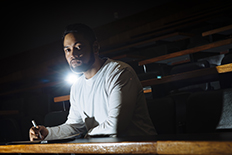 Adam Faatoese.
Adam Faatoese.
Cultural awareness is a vital part of bioethics, says Adam Faatoese.
Born and raised in Dunedin, Adam's Samoan and Tuvaluan heritage give him an advantage when studying how people with predominantly western backgrounds view other cultures.
After getting a pre-university taste of genetics at Hands-On Science, Adam took biochemistry at Otago. “It was a good, broad degree to start with, but after talking to people in the department I switched to focus on genetics. Classes were smaller, and the staff were very helpful.”
Adam took a bioethics paper for interest. “In genetics you work with live material and patient samples and you get to learn respect and ethics along the way, but you may not realise how important they are until you separate them out.
“When you are in one culture you may not know how other cultures think, and it's important to have courtesy and acknowledge other people's sensitivities, even if their perspectives differ from your own.”
On graduating, Adam was accepted for a master's programme, but decided to train as a doctor, and joined medical school as a graduate.
“The medical profession works with people from many different backgrounds, especially in New Zealand society, which is so diverse. If doctors understand bioethics they're likely to be able to help their patients better.
“I'm hoping to take what I have learned so far and be able to apply it on the front line in the future. Eventually I'd love to check out some of the Pacific Islands and help out in the community.”
Adam's community involvement included the Otago Samoan Students' Association, helping with tutoring, assisting high school students at Otago's Advanced School Science Academy, and keeping fit with rugby.
His advice?
“You have to study hard but you still have to have fun. It's all about balance.”